Writing as a way of healing from traumatic experiences, has recently gained attention and respect in the mental health field. The Pongo Teen Writing Project has been doing this work for 20 years with underserved youth inside juvenile detention centers, homeless shelters, and psychiatric hospitals. It has received recognition through two recent TV news stories, on PBS NewsHour (with U.S. Poet Laureate Natasha Trethewey) and on KING5-TV in Seattle (which won an Emmy). Now Pongo is propagating its therapeutic model around the country through a new book, Writing with At-Risk Youth, and through the resources (including writing activities) on the Pongo web site. Richard Gold, the founder of Pongo and creator of the Pongo Method, talks here about the challenges that the youth face after trauma, and about the ways both mentors/teachers and youth can use poetry as a way of healing.
Chelsey Clammer: Obvious first questions: What is Pongo? Where did the name come from?
Richard Gold: The Pongo Teen Writing Project teaches and mentors personal poetry by youth who have suffered childhood traumas, such as abuse, neglect, and exposure to violence. We especially focus on young people who have a hard time expressing themselves. To accomplish our goals, we run and support trauma-informed writing programs inside juvenile detention centers, homeless shelters, psychiatric hospitals, and other sites. We provide youth with the opportunity to write about the worst experiences imaginable – often for the first time – but in a way that feels safe, offers relief, brings creative joy, leads to openness, and facilitates healing. Pongo’s mission is to help our authors understand their feelings, build self-esteem, and take better control of their lives. Pongo is a 19-year-old nonprofit in Seattle that has served 7,000 youth, and that now teaches our methods around the country with the expectation that we will help thousands more youth in the years to come.
The name “Pongo” comes from a character in my own poetry. He’s a puppet, like Pinocchio, who is searching for what it means to be human. In my poetry, Pongo deals with some funny and risqué experiences, as well as serious topics. But in the end, he realizes that compassion is what will transform him.
CC: What different sorts of needs within a variety of communities does Pongo serve?
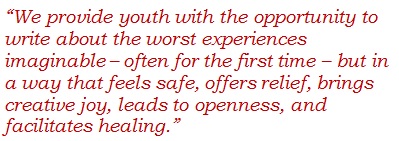 RG: Pongo’s work is “trauma-informed.” In other words, we have an understanding of the deep impact of trauma on the inner lives of our writers, where trauma leaves people with a fragmented experience of life (cut off sometimes from memory and feeling), with a terrible sense of personal defectiveness, and with an alienating sense of isolation. But we have a methodology that facilitates openness and that supports new writers in discovering personal writing. We have facilitated poems recently that dealt with incest, with watching a father beat mom bloody, with watching mom overdose (and feeling responsible), with dealing with a dad who is manic depressive, with being beside a cousin who is murdered in a drive-by shooting. Painful as these subjects are, our writers benefit from writing about their difficult histories. In our surveys of 1,000 of our writers, 100% report enjoying writing, 98% report feeling proud of their writing, 82% report feeling better after writing, 75% report writing about things they don’t normally discuss, and 94% expect to write more in the future.
RG: Pongo’s work is “trauma-informed.” In other words, we have an understanding of the deep impact of trauma on the inner lives of our writers, where trauma leaves people with a fragmented experience of life (cut off sometimes from memory and feeling), with a terrible sense of personal defectiveness, and with an alienating sense of isolation. But we have a methodology that facilitates openness and that supports new writers in discovering personal writing. We have facilitated poems recently that dealt with incest, with watching a father beat mom bloody, with watching mom overdose (and feeling responsible), with dealing with a dad who is manic depressive, with being beside a cousin who is murdered in a drive-by shooting. Painful as these subjects are, our writers benefit from writing about their difficult histories. In our surveys of 1,000 of our writers, 100% report enjoying writing, 98% report feeling proud of their writing, 82% report feeling better after writing, 75% report writing about things they don’t normally discuss, and 94% expect to write more in the future.
Pongo works closely with prominent community psychiatrists from the University of Washington School of Medicine. We collect data, we share our authors’ stories (anonymously) with the larger community, we serve as advocates for the healing power of poetry.
Most important, today we not only run writing projects locally in Seattle, but we train people nationally in our methods, along with providing a number of free resources to teaching artists, counselors, teachers, and youth on our web site.
CC: Often times, if not always, rap/hip hop is the main form of expression within the working class and communities of color that your organization serves. How do you work with the different messages that rap gives the youth—both positive and negative?
RG: Youth sometimes first come to us expecting to write rap, but we explain that we want them to “write from the heart about who you are.” We direct them toward personal writing, which is ultimately very gratifying and healing for them. Young people and institutions come to value the courage, human qualities, and connection that are associated with openness in creative expression.
CC: While we are aware of the challenges that the youth face, what are some of the challenges that the counselors, teachers, and other adults who try to help them face?
RG: This is a very important point. Pongo has its volunteers write their own poetry, in their own writing group that meets before they sit down with the youth. Poetry serves the volunteers by helping them process the trauma they hear from the youth – and process the trauma in their own lives that is recalled in the process of working with the youth.
CC: How did Writing with At-Risk Youth come about?
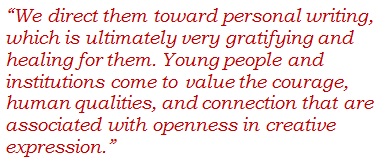 RG: About 12 years ago I met Kay Adams, a journal therapist who was then head of the National Association of Poetry Therapy. Several years ago Kay was asked to edit a series of books on expressive writing for the publisher Rowman & Littlefield Education. Kay contacted me to write a book in the series.
RG: About 12 years ago I met Kay Adams, a journal therapist who was then head of the National Association of Poetry Therapy. Several years ago Kay was asked to edit a series of books on expressive writing for the publisher Rowman & Littlefield Education. Kay contacted me to write a book in the series.
But more fundamentally, the opportunity to write my book, Writing with At-Risk Youth: The Pongo Teen Writing Method, enabled me to realize my dream of recording my 20+ years of experience in order to propagate Pongo’s important work.
CC: Is there any youth poetry or other creative works by/about the youth you would like to share?
RG: Here is a sample Pongo poem:
DEAR MOM
by a young woman in juvenile detention, age 13
I just thought you should know what I’m doing now. I’m addicted to drugs and in juvie a lot. I am an unloved person who spends a lot of time doing drugs to feel better and not abandoned.
I just thought you should know how I’m feeling. I just hate you. I hate my dad, too. I hate you because you left me one night when I was 7 and never came back. The police broke down the door to take me to foster care. But even before that you brought home men who hurt me and did bad things to me. I hate you for pimping me out. I hate you for packing my nose full of white powder, which is why I have breathing problems now. I hate you for getting me into drugs. I hate you because I ended up in a gang. I hate you.
I just thought you should know what I’ve been through. Since the last time I saw you I’ve been in more foster homes than I can count, but 45-50% of them were abusive. I always ran, but the system found me, didn’t believe me, and put me in another, and another. The time that I was going to be adopted was especially important. They came and picked me, and I lived in their house for a week before they found out about my history and they sent me back.
I just thought you should know what I wish for the future. I hope that somehow I can yell at you without having to see you, to blame all this crap on you. Though it would do nothing for me, at least I wouldn’t have to hold it inside any longer.
I just thought you should know what I don’t miss about you….I don’t miss you at all. I’m glad I don’t have to worry about you leaving me again and not coming back.
I just thought you should know that there is nothing at all that I miss about you.
I just thought you should know that no matter what, you’ll always be my mom, and I’ll always love you.
Dedicated to my mom
Richard Gold founded the Pongo Teen Writing Project, a nonprofit that offers unique therapeutic poetry programs to adolescents who are homeless, in jail, or in other ways leading difficult lives. Pongo authors will often write about childhood traumas, such as abuse or loss from violence, but in a way that helps them understand their feelings, build self-esteem, and develop tools that help them in the future. In its 19 years, Pongo has worked with over 7,000 teens.
Before founding Pongo, Richard was managing editor of Microsoft Press. In 2010, Richard was named a Microsoft Integral Fellow, honored for his work with Pongo, by Bill and Melinda Gates and the Microsoft Alumni Foundation. The award was judged by journalist Tom Brokaw and the heads of five prominent national foundations.
A book of Richard’s illustrated poetry, The Odd Puppet Odyssey (Black Heron Press, 2003) introduces the character Pongo. Pongo is a puppet, like Pinocchio, who struggles awkwardly with becoming human, until he discovers the importance of compassion.
Chelsey Clammer has been published in The Rumpus, Essay Daily, and The Nervous Breakdown among many others. She is the Managing Editor and Nonfiction Editor for The Doctor T.J. Eckleburg Review, as well as a columnist and workshop instructor for the journal. Clammer is also the Nonfiction Editor for Pithead Chapel and Associate Essays Editor for The Nervous Breakdown. She has two essay collections forthcoming in Spring 2015. www.chelseyclammer.com.

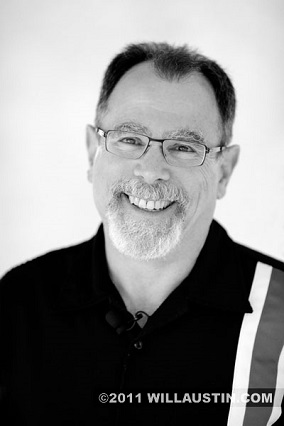
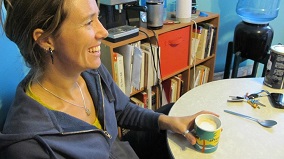
 Arianne Zwartjes brings the body into her writing. In Detailing Trauma, she looks at our anatomy and the intricate interactions between our organs, blood, muscles, tissues—all of it, really—in order to discover something about trauma and healing. Here, Zwartjes speaks further about hybridity and stretching the boundaries of genre, as well as a multitude of ways in which writing enriches our world and our experience of it.
Arianne Zwartjes brings the body into her writing. In Detailing Trauma, she looks at our anatomy and the intricate interactions between our organs, blood, muscles, tissues—all of it, really—in order to discover something about trauma and healing. Here, Zwartjes speaks further about hybridity and stretching the boundaries of genre, as well as a multitude of ways in which writing enriches our world and our experience of it.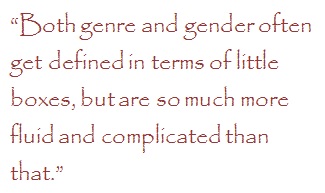 But when I sit down to write, I’m not thinking about “rebelling” or how what I write is going to break some boundary or evoke questions about its form. I’m writing what I like to read (or at least, I’m trying to do so): work that is multi-layered, thinky, linguistically beautiful, critical and questioning. I like work that brings together lots of different ideas, and looks at the sparks they create when they collide, and so that’s the way my writing process often occurs, also—putting very disparate things side by side, and seeing if they create chemistry. I like, also, to play with the tension between a given language set, often something technical like medicine, and my subject matter, which is often much more personal.
But when I sit down to write, I’m not thinking about “rebelling” or how what I write is going to break some boundary or evoke questions about its form. I’m writing what I like to read (or at least, I’m trying to do so): work that is multi-layered, thinky, linguistically beautiful, critical and questioning. I like work that brings together lots of different ideas, and looks at the sparks they create when they collide, and so that’s the way my writing process often occurs, also—putting very disparate things side by side, and seeing if they create chemistry. I like, also, to play with the tension between a given language set, often something technical like medicine, and my subject matter, which is often much more personal.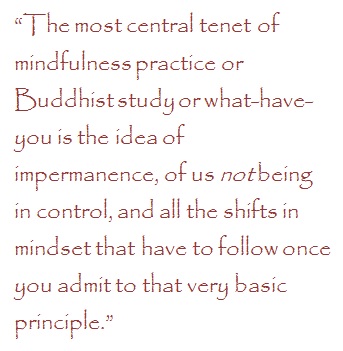 AZ: You know I think there’s a real dualism present in US society, because on the one hand we have this incredible, arrogant rhetoric about being “world leaders” and having all this influence and control around the world—and financially and militarily, unfortunately, we do—and all this capitalist advertisement-based rhetoric about becoming perfect: perfectly happy, perfectly beautiful, perfectly safe. But at the same time we’re very aware, on a gut level, that we are very much not in control, that our bodies get older and break down, that we can’t even predict, let alone control, what will happen to us in the next 24 hours. In fact, I think most of the rhetoric of the former probably has to do with our denial of the latter—or at least, to do with both that and with power. I’ve had a very serious meditation practice for a long time now, and really the most central tenet of mindfulness practice or Buddhist study or what-have-you is the idea of impermanence, of us not being in control, and all the shifts in mindset that have to follow once you admit to that very basic principle.
AZ: You know I think there’s a real dualism present in US society, because on the one hand we have this incredible, arrogant rhetoric about being “world leaders” and having all this influence and control around the world—and financially and militarily, unfortunately, we do—and all this capitalist advertisement-based rhetoric about becoming perfect: perfectly happy, perfectly beautiful, perfectly safe. But at the same time we’re very aware, on a gut level, that we are very much not in control, that our bodies get older and break down, that we can’t even predict, let alone control, what will happen to us in the next 24 hours. In fact, I think most of the rhetoric of the former probably has to do with our denial of the latter—or at least, to do with both that and with power. I’ve had a very serious meditation practice for a long time now, and really the most central tenet of mindfulness practice or Buddhist study or what-have-you is the idea of impermanence, of us not being in control, and all the shifts in mindset that have to follow once you admit to that very basic principle.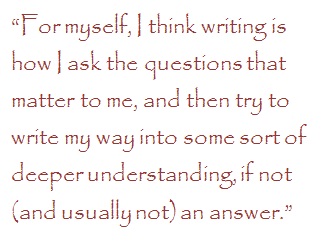 AZ: I think the question of role is very personal, different for every individual. Obviously it’s critically important to find the voices of others out there in the world who have experienced, and found their way through the tangled labyrinth of healing from, a similar trauma to yours, whatever it may be. So the role of writers working through, publically and honestly and vulnerably and transformatively, their own struggles is critically important in the sense of offering succor, a sort of light forward. On the flip side, though, the question of how one navigates one’s way through via writing is very individual. For myself, I think writing is how I ask the questions that matter to me, and then try to write my way into some sort of deeper understanding, if not (and usually not) an answer.
AZ: I think the question of role is very personal, different for every individual. Obviously it’s critically important to find the voices of others out there in the world who have experienced, and found their way through the tangled labyrinth of healing from, a similar trauma to yours, whatever it may be. So the role of writers working through, publically and honestly and vulnerably and transformatively, their own struggles is critically important in the sense of offering succor, a sort of light forward. On the flip side, though, the question of how one navigates one’s way through via writing is very individual. For myself, I think writing is how I ask the questions that matter to me, and then try to write my way into some sort of deeper understanding, if not (and usually not) an answer.